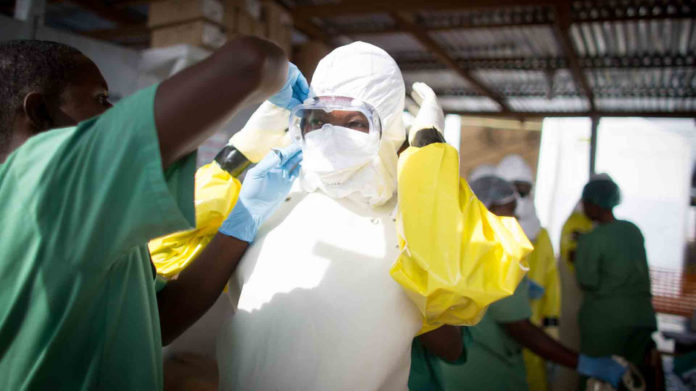Ebola survivors urged to abstain from sex indefinitely due to newfound risk

The Centers for Disease Control and Protection is warning Ebola survivors to abstain from sex or use a condom when they engage in sexual intercourse, following a discovery that suggests the virus may be spread through semen long after previously thought.
The agency changed its guidelines this week to advise those who have had the disease to avoid any type of sexual relations without a condom “until more information becomes available.” Survivors were previously instructed to wait three months before sex, which was the longest the Ebola virus had ever been recorded to remain in the semen of an Ebola patient.
The CDC’s update follows on the heels of similar adjustments issued by the World Health Organization and Liberia’s government over the past few weeks.
The changes were prompted by evidence that pointed to the possibility that a Liberian man passed the disease to his female sexual partner months after he had recovered from Ebola, according to WHO spokesperson Daniel Epstein.
Ebola found in a semen sample taken from the man 175 days after he tested negative partially matched the genetic material of the virus found on the woman, Ruth Tugbah, who later died from the disease. Before now, the longest period of time the virus was detected in semen was 101 days.
There are currently no proven cases of Ebola passing from a recovered patient to a partner through sex, but public health agencies say they cannot rule out the possibility.
The WHO is holding a meeting of medical experts later this week where researchers are expected to provide an update on the case, Epstein said. The group will review the latest evidence in hopes of determining the duration that the virus can last in other bodily fluids such as vaginal or eye fluid and whether the virus is actually still infectious or simply genetic material.
The new evidence may raise questions about how public health officials should continue to respond to the waning epidemic, which, as of Tuesday, had sickened 25,872 and killed 10,721 across Guinea, Liberia and Sierra Leone, the countries with widespread transmission, per the CDC.
As with the treatment of HIV and AIDS, governments and health organizations must tread carefully when dealing with sexual transmission in order to avoid stigmatizing survivors and respect victims’ privacy.
The WHO advises governments in order to avoid inflicting undue harm on survivors, instead recommending that they “promote the demonstration of respect, dignity and compassion towards all survivors, their partners and families,”
The New York Times reported that health officials in Sierra Leone are facing accusations of acting with duress when seeking a semen sample from a man who claimed to be impotent. The WHO has also received reports of Ebola survivors accused of infecting partners being detained in the country.
The epidemic in West Africa is the largest of its kind in history, according to the CDC. Health officials said the epidemic was winding down earlier this year as the number of reported cases began to dwindle.
Tugbah became Liberia’s first Ebola patient in nearly three weeks last month, dashing the country’s hopes of meeting the WHO-mandated 42-day timeframe needed to be declared Ebola-free.
Have something to add to this story? Share it in the comments.
